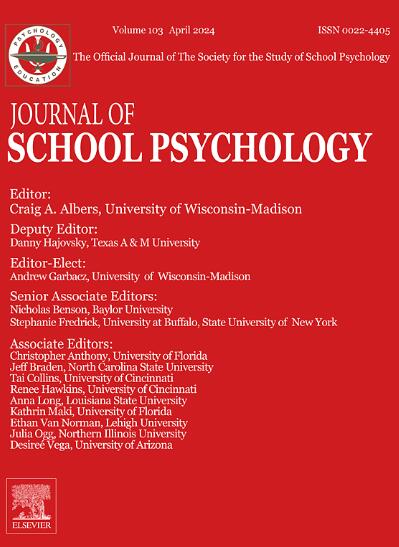虚拟辅导模式V-COACH支持职前教师实施虚拟循证阅读干预的效果
IF 4.1
1区 心理学
Q1 PSYCHOLOGY, SOCIAL
引用次数: 0
摘要
研究表明,许多教育工作者难以忠实地实施循证实践(ebp)。指导可用于支持实施,但有几个障碍经常阻碍指导在以学校为基础的环境中进行。支持教育工作者实施ebp的一种方法——无论他们是在线授课还是面对面授课——就是使用虚拟教练。本研究采用并行多基线随机设计,硕士水平的职前教师参与者接受了一个虚拟版本的结构化指导模型(称为虚拟教练),以支持他们实施EBP阅读。视觉分析和效应量分析表明,虚拟教练对每位干预者的保真度(依从性和/或质量)具有显著且普遍较大的影响,对于基线保真度水平范围不同的干预者也是如此。通过对教师-教练联盟的测量,证据还表明虚拟教练通常具有良好的社会效度,并允许在教练和教师之间建立高质量的工作关系。讨论了本研究的意义和未来的研究方向,并为COACH作为提高校本干预用户忠诚度的可行模型的有效性提供了额外的实验证据。本文章由计算机程序翻译,如有差异,请以英文原文为准。
Effects of V-COACH, a virtual coaching model in supporting pre-service teachers' implementation of a virtual evidence-based reading intervention
Research suggests that many educators struggle to implement evidence-based practices (EBPs) with fidelity. Coaching can be used to support implementation, but several barriers often prevent coaching from occurring in school-based settings. One way to support educators' implementation of EBPs—whether they deliver instruction online or in person—is with virtual coaching. Using a concurrent multiple-baseline design with randomization, master's level pre-service teacher participants in this study received a virtual version of a structured coaching model (referred to as virtual COACH) to support their implementation of an EBP for reading. Visual analyses and effect size analyses showed that virtual COACH had a significant and generally large effect on each interventionist's fidelity (with adherence and/or quality), and this was true for interventionists with a range of different fidelity levels at baseline. Using a measure of teacher-coach alliance, evidence also suggested that virtual COACH generally had good social validity and allowed for establishing a quality working relationship between the coach and teacher. Implications and future research directions are discussed, and the present study provides additional experimental evidence for the effectiveness of COACH as a feasible model for improving users' fidelity of school-based interventions.
求助全文
通过发布文献求助,成功后即可免费获取论文全文。
去求助
来源期刊

Journal of School Psychology
PSYCHOLOGY, EDUCATIONAL-
CiteScore
6.70
自引率
8.00%
发文量
71
期刊介绍:
The Journal of School Psychology publishes original empirical articles and critical reviews of the literature on research and practices relevant to psychological and behavioral processes in school settings. JSP presents research on intervention mechanisms and approaches; schooling effects on the development of social, cognitive, mental-health, and achievement-related outcomes; assessment; and consultation. Submissions from a variety of disciplines are encouraged. All manuscripts are read by the Editor and one or more editorial consultants with the intent of providing appropriate and constructive written reviews.
 求助内容:
求助内容: 应助结果提醒方式:
应助结果提醒方式:


